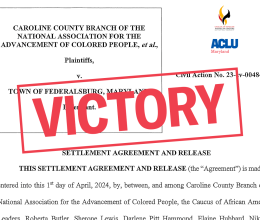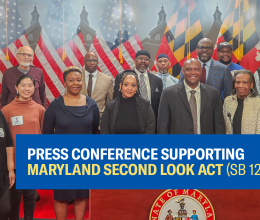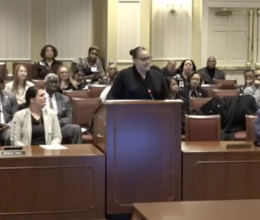
- Circuit Court ruling on fees and costs in NAACP v. MSP
- Circuit Court ruling on MSP motion for reconsideration
FOR IMMEDIATE RELEASE:
Tuesday, December 23, 2014
CONTACT: Meredith Curtis, ACLU of Maryland, 443-310-9946; media@aclu-md.org
Gerald Stansbury, Maryland NAACP, 410-533-7302, stansger@yahoo.com
BALTIMORE, MD - Today, a Circuit Court judge strongly upheld the right to public information and the ability of citizens to hold their government accountable by granting a full award of attorneys' fees and costs to the civil rights lawyers representing the Maryland State Conference of NAACP Branches (NAACP) in a long-running case seeking records of racial profiling complaints against the Maryland State Police (MSP). The American Civil Liberties Union (ACLU) of Maryland, which, along with Venable LLP, represents the NAACP in this case, join with the group in heralding this ruling, which includes a legal award of nearly $590,000 for over seven years of fiercely contested litigation as MSP continued to refuse to release records of complaints.
"This ruling sends a strong message to government officials, particularly law enforcement, that transparency and accountability is vital to a healthy relationship with the communities they serve," said Gerald Stansbury, President of the Maryland State Conference of NAACP Branches.
"As concerns about police practices have dramatically increased due to recent events in Maryland, and around the country, tools like public information laws are more important than ever in citizens' ability to hold law enforcement accountable," said Deborah Jeon, Legal Director for the ACLU of Maryland. "With this important decision, Judge Martin places high value upon the efforts of those who fight long legal battles to secure public access to information about how the government addresses civil rights complaints, which will help bring the promises of our civil rights and freedom of information laws closer to reality."
Seth Rosenthal, an attorney who has led the Venable legal team since 2007, added:
"By allowing the fees sought by the NAACP, the Court recognized that in cases such as these, it is necessary to invest significant resources to produce precedential rulings that advance the twin causes of civil rights and government accountability."
BACKGROUND:
In March 2014, Judge Timothy J. Martin issued a powerful opinion on the importance of court awards of fees and costs in civil rights cases brought under the Maryland Public Information Act.
In August, MSP asked Judge Martin to reconsider that ruling, asserting that he must have been confused. Today, Judge Martin made clear it was not the Court that was confused - again firmly rejecting State Police arguments that the case was unimportant, and that the NAACP and its attorneys should be paid nothing for their years of legal work:
The long and exhausting battle in the enforcement of civil rights in this country and in this state is of paramount importan[ce] to all citizens. To require the NAACP to underwrite on its own the expenses to secure performance by the MSP of providing these documents ordered by this Court six years ago and ultimately ordered by the Court of Appeals is a discomforting concept to the Court.
In January 2013, the Maryland Court of Appeals ruled that MSP had to turn over records pertaining to racial profiling complaints under the state's public information law. Since 2007, the ACLU and NAACP have maintained that MSP has violated the state's public information law by improperly withholding documents that would show whether it has meaningfully investigated profiling complaints. The high court ruling rejected the Attorney General's blanket assertion that those documents could never be released, holding instead that redaction of personal information amply protects the privacy interests of those involved.
The NAACP's purpose in pursuing the records all along has been to determine whether the MSP is truly investigating the complaints and taking seriously its responsibility to eliminate racial profiling by its troopers. However, the MSP refused to turn over the documents, saying that all records of complaints and investigations were "personnel records" exempt from disclosure under the Maryland Public Information Act (MPIA), even when all identifying information is redacted.
In 2003, the NAACP and the MSP entered into a Consent Decree in racial profiling litigation initiated in the early 1990s. The MSP agreed to make the process for motorists to file racial profiling complaints more user-friendly and to thoroughly investigate all such complaints. During the four-year period following entry of the Decree, approximately 100 official complaints alleging racial profiling were filed by minority motorists. However, the MSP found that not a single one of these complaints had merit. No MSP trooper has ever been found to have engaged in racial profiling, and no disciplinary action has ever been taken against a trooper for racial profiling.
Plaintiffs are represented by pro bono attorneys Seth Rosenthal, Brian Schwalb, and Joeann Walker from the law firm Venable, LLP, and Deborah Jeon from the ACLU of Maryland.
###







